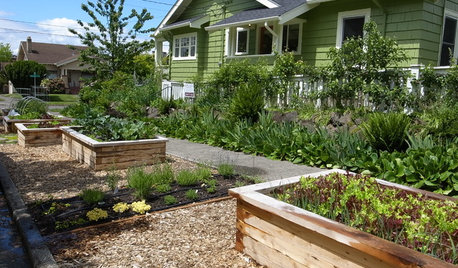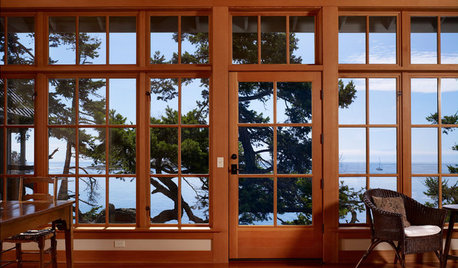Carbon induced N deficiency
Lloyd
11 years ago
Related Stories

FARM YOUR YARDHow to Farm Your Parking Strip
Get an up-close look at a thriving street-side edible garden, one of many sprouting up in Seattle
Full Story
FARM YOUR YARDHow to Grow Vegetables in Containers
Get glorious vegetables and fruits on your patio with a pro’s guidance — including his personal recipe for potting mix
Full Story
MOST POPULAREasy Green: 23 Ways to Reduce Waste at Home
Pick from this plethora of earth-friendly ideas to send less to the landfill and keep more money in your pocket
Full Story
GARDENING GUIDESGarden Myths to Debunk as You Dig This Fall and Rest Over Winter
Termites hate wood mulch, don’t amend soil for trees, avoid gravel in planters — and more nuggets of garden wisdom
Full Story
LIGHTINGHouse Hunting? Look Carefully at the Light
Consider windows, skylights and the sun in any potential home, lest you end up facing down the dark
Full Story
MOST POPULAR11 Nominees for the ‘She Shed’ Hall of Fame
These special sanctuaries let busy women get away from it all without leaving the backyard
Full Story
HOME OFFICESThe 20 Most Popular Home Office Photos of 2015
Technology paves the way for space-saving work areas, while designers make up for small sizes with style
Full StoryMore Discussions









feijoas
pnbrown
Related Professionals
Danbury Landscape Architects & Landscape Designers · Clark Landscape Architects & Landscape Designers · Barrington Landscape Contractors · Bedford Landscape Contractors · Brookline Landscape Contractors · Concord Landscape Contractors · Duarte Landscape Contractors · Forest Hills Landscape Contractors · Mastic Beach Landscape Contractors · San Rafael Landscape Contractors · Tehachapi Landscape Contractors · East Norriton Landscape Contractors · Freehold Decks, Patios & Outdoor Enclosures · Randolph Decks, Patios & Outdoor Enclosures · Richmond Decks, Patios & Outdoor EnclosuresKimmsr
allen456
pnbrown
rott
allen456
gardengal48 (PNW Z8/9)
pnbrown
jolj
User
LloydOriginal Author
pnbrown
Laurel Zito
allen456
rott
Laurel Zito
LloydOriginal Author
User
pnbrown
emgardener
LloydOriginal Author
val_s
toxcrusadr
kqcrna
LloydOriginal Author
kqcrna
LloydOriginal Author
Laurel Zito
LloydOriginal Author
gnhelton
Laurel Zito
jolj
Laurel Zito